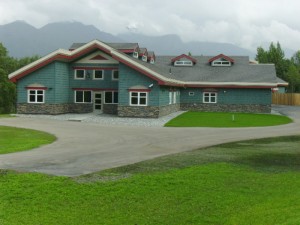This week Alaska Public Media is exploring the Blind Spot – how youth who are part of and outside of the juvenile justice system are getting help for substance abuse. One option is inpatient programs like the Adolescent Residential Center for Help in Eagle River, part of the Volunteers of America in Alaska, which Anne Hillman toured with one young resident.
Summer walked me through the crisp white, high-ceilinged halls of the ARCH substance abuse treatment facility. Summer is a minor, so we aren’t using her real name. We pass artwork painted by some of the center’s residents, and stops at a massive whiteboard covered with rules and notes.
“This is our reflections board,” Summer told me.
“What’s that mean?” I ask.
“Basically,” she replied, “if you’re on reflections with someone you can’t actually talk to them. You kind of pretend that they don’t exist.”
The exterior of the ARCH building. (Photo via Volunteers of America – Alaska/Adolescent Residential Center for Help website)

The exterior of the ARCH building. (Photo via Volunteers of America – Alaska/Adolescent Residential Center for Help website)
The idea is to stop having unhealthy conversations or codependent relationships. Sometimes all 24 young people living in the house are on reflections, and are only allowed talk to each other during allotted times, like group therapy. Summer hasn’t been allowed to talk to one of her friends for months.
“Do you miss talking to him?” I ask.
“Yes. He’s a good friend.”
“What’s it like to be in the same room with him and not–”
“Talk to him?” Summer finishes. She explains that because they’re both in the facility they still get to see each other and gauge one another’s progress. “And you still support them by moving forward.”
Summer is completing six months of treatment for substance abuse. She started using drugs when she was 14. Her older boyfriend gave them to her. She says no one in her family noticed because she was still involved in activities at school and had a job. Then she started abusing prescription pills, and eventually alcohol and pot. Her relationships with guys were unhealthy. By 17, she was acting out and her parents kicked her out of the house. She chose to come to ARCH last summer, because she knew a friend of hers would be here.
“It was nothing like I expected,” she admitted. “I expected it to be lots more loose-fitting. A bunch of kids just slumming it out, not really doing anything.”
Instead, she found an extremely structured and restricted environment.
“We create a system of order rather than chaos here,” explained Program director Julia Jackson. It’s partly to help the residents feel safe, “But we also indirectly reinforce that there’s a sense of ownership, self responsibility, an obligation to interact in socially appropriate ways, and there’s a sense of law and order here, just like there is in societies.”
The rules are meant to keep the teenagers focused on their treatment. To that end, even reading books and listening to music require special permission.
“Adolescents want to escape,” Jackson said. “We have lost many a child to The Hobbit.”
She maintains the program works because it teaches the clients to respect and understand themselves, and how drugs affect them. It gives them skills to resist using substances, and provides a group of counselors they can call as a safety net. Most of the people who leave the program relapse at least once.
“But,” Jackson clarifies, “the number is very high–and getting higher–of individuals who leave, have minor difficulties and struggles, and get back on track.”
However, the organization doesn’t have data showing this. It is up to former residents to self-report how they are doing, and the center lacks a complete picture. The evidence is anecdotal.
Unlike Summer, most of the clients at the ARCH program are referred by the Department of Juvenile Justice, creating a strong motivation to participate.
“It’s sometimes a lot easier to rely on legal consequences,” Jackson concedes, “especially when you’re dealing with the adolescent brain, where it’s about instant gratification. It’s about short-term sight, what’s right in front of you–not seeing the long-term goal.”
Summer and I walk into the girls’ wing. Her room has a small bulletin board covered with pictures but otherwise it’s pretty bland. Residents can only have more decorations or other personal items if they have special permission called an “intervention.” From an outsider’s perspective, the room seems austere.
But Summer doesn’t see it that way. She’s currently transitioning into living with her grandparents, which brings passes off the ARCH facility.
“When I came back from my home pass I was like ‘Oh, I’m home! My bed,’” she said, lighting up. “It’s like a house full of family here.”
Summer is getting ready to leave the program. She’s nervous, but likes the idea of being back in the real world. She has plans for the future: Stay away from most of her old friends, finish high school, learn a trade, then travel. And she wants to focus on healthy relationships.
“It took me three months to realize that I was important,” she said. She has realized that guys treated her poorly, and allowed her to hurt herself.
“I didn’t deserve it,” Summer said. And that is the lesson she will take with her for life.
Originally published April 21, 2015 by Zachariah Hughes and Anne Hillman in KSKA
